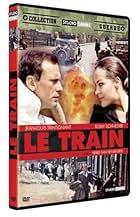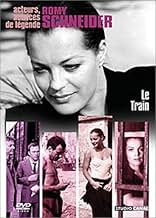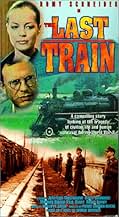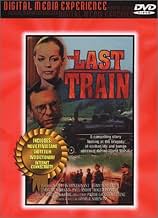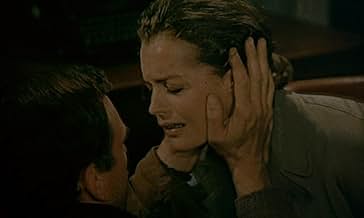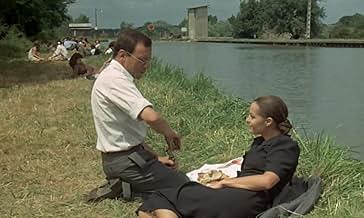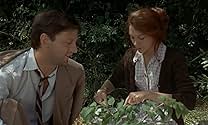IMDb रेटिंग
6.9/10
1.9 हज़ार
आपकी रेटिंग
अपनी भाषा में प्लॉट जोड़ेंTwo people, a Frenchman Julien Maroyeur and a Jewish German woman (Anna Kupfer) met on a train while escaping the German army entering France.Two people, a Frenchman Julien Maroyeur and a Jewish German woman (Anna Kupfer) met on a train while escaping the German army entering France.Two people, a Frenchman Julien Maroyeur and a Jewish German woman (Anna Kupfer) met on a train while escaping the German army entering France.
- पुरस्कार
- कुल 1 नामांकन
फ़ीचर्ड समीक्षाएं
And also the most known French film about the 1940 French exodus, trying to escape from the Nazi invasion. You had EN MAI FAIS CE QU'IL TE PLAIT, back in 2015, also a very good movie, with the same settings. The other strength of this movie, besides the gripping story, is that the director Granier Deferre was only 13 years old at this time and actually lived this tragic period. So, he was the best placed to provide many of accurate details, that would probably not have been shown in another feature. For instance, those women who took advantage of the train stop, in the middle of the country side, to take a pee, in a field. Then a nazi plane arrives and bombards the area. Three seconds later after the smoke has left, we see the two cadavers of the poor women. Or the scene of a man, also taking a pee, standing between wagons, during a train stop ( of course;;;) Some folks have said that you have some lengths in the film, I agree, but in this kind of feature, lengths are sometimes unavoidable. If you had filled this film with plenty of action sequences, would that had been credible? Hell no. A memorable ending that would have made, even a Waffen SS trooper weep. Believe me.
The film is developed during the Lightning War(Blitzkrieg) a military tactics inaugurated by Hitler and carry out by such combat commanders as General Guderian, commanding the Panzers troops, in the French campaigns of 1940. The accent was no longer placed on endless columns of soldiers marching a few miles a day. Instead of the static lines Lightning War emphasized mobility and fluidity, destroying thousands of artillery pieces as well as several French infantry divisions.The enemy was slowed down by bombing from the air all his means of communications and transportation, trains, roads and the opposing air force was destroyed on the ground. The German regular infantry , foot soldiers and motor-drawn artillery were committed to mop up resistance and join up with advances forces. The French invasion is well reflected in documentary stuff added into the movie. French people attempt to flee by any means possibles, throwing the fugitives and defenders into hopeless confusion . A radio repairman named Julien(Jean Louis Trintignant ) aboard a train with his pregnant spouse and kid. But he's placed in cattle wagon and his family in passengers cars . There Julien knows Jewish-German woman named Anna(Romy Schneider),and falls in love with her.Furthermore they befriend to remainder passengers(Regina,Serge Marquand, among others).
This is an interesting drama/war developed in a French train during the 40s and based on novel by George Simenon,'Inspector Maigret's author'.It's the feeling story about a doomed love with sweet moments and sad ending with fateful destination. Extraordinaries performances from duo protagonist, as Jean Louis Trintignant as insignificant father of family turned into enamored and Jewish saving, and an enjoyable Romy Schneider as long-suffering Jewish turned into Resistance fighter. Colorful cinematography by Walter Wottitz who also photographed 'The train' by John Frankenheimer. Emotive and atmospheric musical score by Philippe Sarde. The motion picture is well directed by Pierre Granier-Deferre who added extensive documentary footage. Writer and filmmaker Pierre Granier directed to French all-stars, Jean Louis Trintignant, Alain Delon but specially worked with Jean Gabin and Lino Ventura ; and again directed to Romy Schneider in 'A woman at her window' . Rating : Better than average.
This is an interesting drama/war developed in a French train during the 40s and based on novel by George Simenon,'Inspector Maigret's author'.It's the feeling story about a doomed love with sweet moments and sad ending with fateful destination. Extraordinaries performances from duo protagonist, as Jean Louis Trintignant as insignificant father of family turned into enamored and Jewish saving, and an enjoyable Romy Schneider as long-suffering Jewish turned into Resistance fighter. Colorful cinematography by Walter Wottitz who also photographed 'The train' by John Frankenheimer. Emotive and atmospheric musical score by Philippe Sarde. The motion picture is well directed by Pierre Granier-Deferre who added extensive documentary footage. Writer and filmmaker Pierre Granier directed to French all-stars, Jean Louis Trintignant, Alain Delon but specially worked with Jean Gabin and Lino Ventura ; and again directed to Romy Schneider in 'A woman at her window' . Rating : Better than average.
10myschrec
May 1940. The Germans invade France and thousands flee on trains heading for safety. A man is separated from his pregnant wife and young daughter. He meets a woman on the train and protects her. She is a German Jew -- suspected by the French -- and wanted by the Nazis.
With actual footage from WWII, this film feels more like a documentary, which of course adds to the drama. The characters -- even the minor ones -- are well drawn and evoke sympathy. Romy Schneider -- a beauty in so many other films -- displays her incredible acting prowess. And Jean-Louis Trintignant, who became well known after "Z" (1969) and "The Conformist" (1970), is incredible: low-keyed, soft-spoken and poignant. Can two people fall in love so quickly? Under such dire circumstances that keep getting worse, this strange romance seems so real.
For the most part, this is not a Holocaust film ... nor a film about Nazi atrocities. But the fear of German aggression is palpable. One character tells another -- as they see the results of the German aircraft bombing: "Close your eyes, you'll never know it happened." This is what all refugees desire -- to escape and forget. But this is a film that doesn't want you to forget the prejudice, selfishness, and other horrors of war. But it also reminds you of the gentleness and humankindness.
"It's them. I'd recognize that sound anywhere." I am reminded of the Holocaust survivor who could not sleep for years because of the sounds she heard in her dreams/nightmares.
The last seven minutes are some of the most frightening and intelligent minutes dealing with the Holocaust even put on film The scene is fraught with danger and filled with possibilities. The ethical dilemma will generate hours of thought and discussion.
With actual footage from WWII, this film feels more like a documentary, which of course adds to the drama. The characters -- even the minor ones -- are well drawn and evoke sympathy. Romy Schneider -- a beauty in so many other films -- displays her incredible acting prowess. And Jean-Louis Trintignant, who became well known after "Z" (1969) and "The Conformist" (1970), is incredible: low-keyed, soft-spoken and poignant. Can two people fall in love so quickly? Under such dire circumstances that keep getting worse, this strange romance seems so real.
For the most part, this is not a Holocaust film ... nor a film about Nazi atrocities. But the fear of German aggression is palpable. One character tells another -- as they see the results of the German aircraft bombing: "Close your eyes, you'll never know it happened." This is what all refugees desire -- to escape and forget. But this is a film that doesn't want you to forget the prejudice, selfishness, and other horrors of war. But it also reminds you of the gentleness and humankindness.
"It's them. I'd recognize that sound anywhere." I am reminded of the Holocaust survivor who could not sleep for years because of the sounds she heard in her dreams/nightmares.
The last seven minutes are some of the most frightening and intelligent minutes dealing with the Holocaust even put on film The scene is fraught with danger and filled with possibilities. The ethical dilemma will generate hours of thought and discussion.
France during 1940 to 1943 as seen by the acute observer Georges Simenon, an author who wrote the Maigret series, admired for his penetrating insights into the traditional lives of the French. It should be remembered by non-French viewers, that the French remember their dead from The Great War (WW1) on crosses and plaques in almost every village in France. (America came to understand this on 9/11, though only three places were hit.) Also that WW1 was fought on French soil. Twenty years later they are invaded again. (Maybe they should be blamed for that because of their vengeful Versaille Treaty.) Remember also that President de Gaulle (centre right) and President Mitterand (socialist) refused to take up the accusations of France caving into Hitlers demands and becoming a puppet regime under the name of Vichy which incorporated into its own laws the Nazi anti-Jewish programs. Against this essential background, there are two of Europe's most subtle actors, Jean-Louis Trintignant and Romy Scheider, who give a haunting performance of pathos and love. They flee by a "last" train northern France in 1940, before Paris falls, to the west coast La Rochell (incidentally, the town to be the German submarine base dramatically filmed in Das Boot). Trintignant with other men and unaccompanied women have to make do in a wagon for horses. This is a significant image. Other important images are the changing countryside, the generosity of the French, the first criminal acts of war of Luftwaffe planes shooting on civilians. Trintignant shows kindness, consideration and courage in protecting Romy Schneider. The rhythm begins to liken Ravel's Bolero: he is traditional parochial French, married with children (who are in the train's better compartments), he is inexperienced with other women, ignorant of world events, so he reflects the very subdued key of the beginning of Bolero; she is a German Jew, internationally experienced, knows men, has the instinct of survival. She adds to the sharper tones in Bolero. Their relationship develops in the wagon. He is more careful to transgress marriage boundaries, she does not want to comprise him, but both slowly are drawn to each other in the steady mounting Bolera rhythm. In the wagon, others engage in sexual intercourse and soon she realizes that she must make the first move. She understands that life is to be lived each minute and so their growing love, reaching new rhythmic heights, is consummated. All is natural, natural as horses in a wagon. No morality, no anglo-saxon prudery, just natural, as one understands this on continental Europe and in the East. The bolera rhythm reaches its climax in the last minutes. Three years he has not seen her. When he was reunited with his wife and new born child in La Rochelle she on her own accord left unseen. He is called to the French National Police. The French police worked in close agreement with the Gestapo (the security police arm of the Nazi Party) and just this aspect so ignored by Presidents de Gaulle and Mitterand is where author Georges Simenon subtedly puts in the knife. At the interview, he is confronted with her, arrested for being a Jew with the French Resistance. He denies the French Secret Service Police inspector's questions, but when she is brought in, the climax and (the Boleros crescendo) is released: the last scene is so powerful, love, the essence of life, is dealt doom. Essential to see, for so many lived that life!
In th seventies,Granier-Deferre became the "cinema De Qualité " director par excellence ;more accessible and less pretentious than Claude Sautet after "Max Et Les Ferrailleurs " ,his career really began in the early sixties with two estimable movies with Jean Gabin ("La Horse" and "Le Chat"),he continued with craftsman works such as "La Veuve Couderc" or "Le Train" ,both Georges Simenon's books transferred to the screen.
It may explain the "detective story" ending,which may seem a bit irrelevant in a realistic movie,but it is saved by the talent of the two principals,Schneider and Trintignant,injecting more emotion into the scene than you might think possible.
This is an apt title,for most of the movie takes place on a train,a train full of people running away from the German armies in 1940 (the beginning recalls René Clément's "Jeux Interdits" (1952).The screenwriters made no bones about criticizing French cowardliness and selfishness;it was before "Lacombe Lucien" to be precise ;As the character played by Maurice Biraud remarks :"we're afraid,we are fleeing,so we don't fight each other,get it?" On the train,the characters are stereotypes,particularly the hooker played by Regine ,probably inspired by Maupassant's "Boule De Suif",the unwed mother (oddly portrayed by cerebral (who said tedious?) Anne Wiazemsky,two sex maniacs ("when I look at you (the whore),I look like a beast !- even when you don't!);the Jewish German (Schneider),the average man (Trintignant).
An user complained that this man in the street should leave his pregnant wife and his little girl for a while and sleep with the German woman:in a world gone mad,anything can happen ,it would never have happened,had this electrician continued his routine life .
Following René Clément's steps in "Jeux Interdits" ,GD smartly integrates black and white archives films which ,with a careful editing ,turn color when the director returns to his fiction.Which his predecessor was not able to do.
It may explain the "detective story" ending,which may seem a bit irrelevant in a realistic movie,but it is saved by the talent of the two principals,Schneider and Trintignant,injecting more emotion into the scene than you might think possible.
This is an apt title,for most of the movie takes place on a train,a train full of people running away from the German armies in 1940 (the beginning recalls René Clément's "Jeux Interdits" (1952).The screenwriters made no bones about criticizing French cowardliness and selfishness;it was before "Lacombe Lucien" to be precise ;As the character played by Maurice Biraud remarks :"we're afraid,we are fleeing,so we don't fight each other,get it?" On the train,the characters are stereotypes,particularly the hooker played by Regine ,probably inspired by Maupassant's "Boule De Suif",the unwed mother (oddly portrayed by cerebral (who said tedious?) Anne Wiazemsky,two sex maniacs ("when I look at you (the whore),I look like a beast !- even when you don't!);the Jewish German (Schneider),the average man (Trintignant).
An user complained that this man in the street should leave his pregnant wife and his little girl for a while and sleep with the German woman:in a world gone mad,anything can happen ,it would never have happened,had this electrician continued his routine life .
Following René Clément's steps in "Jeux Interdits" ,GD smartly integrates black and white archives films which ,with a careful editing ,turn color when the director returns to his fiction.Which his predecessor was not able to do.
क्या आपको पता है
- ट्रिवियाAs Granier-Deferre had been part of the Exodus (at the age of 13), he was able to add a lot of personal observations to his description of the flight (such as people remaining cheerful despite the tragedy of the situation, nuns picking flowers in a field during a bombing raid, ...)
- कनेक्शनFeatured in Romy, femme libre (2022)
- साउंडट्रैकL'Attaque
Written and Performed by Philippe Sarde Et Orchestre
टॉप पसंद
रेटिंग देने के लिए साइन-इन करें और वैयक्तिकृत सुझावों के लिए वॉचलिस्ट करें
- How long is The Last Train?Alexa द्वारा संचालित
विवरण
- रिलीज़ की तारीख़
- कंट्री ऑफ़ ओरिजिन
- भाषा
- इस रूप में भी जाना जाता है
- The Last Train
- फ़िल्माने की जगहें
- Saincaize-Meauce, Nièvre, फ़्रांस(mined railroad bridge)
- उत्पादन कंपनियां
- IMDbPro पर और कंपनी क्रेडिट देखें
- चलने की अवधि1 घंटा 35 मिनट
- रंग
- ध्वनि मिश्रण
- पक्ष अनुपात
- 1.66 : 1
इस पेज में योगदान दें
किसी बदलाव का सुझाव दें या अनुपलब्ध कॉन्टेंट जोड़ें

